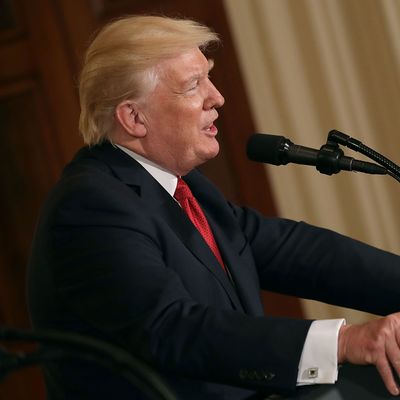
Donald Trump has shot the messenger.
Three weeks ago, the president decided to fire the FBI director who was leading the investigation into his campaign’s possible ties to the Kremlin. The next day, he shared highly classified Israeli intelligence with top Russian officials in the Oval Office — after informing Putin’s foreign minister that James Comey was a “nut job,” whose departure would alleviate the “great pressure” he’d been under due to the FBI’s investigation.
Then, after every White House surrogate — including the president himself — lined up behind a story that pinned responsibility for Comey’s firing on Deputy Attorney General Rod Rosenstein, Trump went on national television and said Rosenstein was irrelevant. The president proceeded to admit that he was thinking about how much he resented the investigation into his campaign when he decided to fire Comey, a statement that arguably constituted a confession to obstruction of justice.
Next, Trump tried to intimidate his former FBI director into silence by threatening to release secret recordings of their conversations — a claim that his communications team had no legally sound means of publicly defending.
Somehow, these actions did not succeed in taking attention away from the investigation into the Trump campaign.
In fact, the president’s bizarre behavior loosened lips throughout the government — and the Washington Post and New York Times have proceeded to sink proverbial ships, on a near daily basis, ever since. In recent weeks, we’ve learned that Trump asked the head of federal law enforcement to pledge personal loyalty to him; directly requested that Comey drop the investigation into his former national security adviser Michael Flynn; hired Flynn despite knowing that the retired general was a paid agent of the Turkish government; and allowed his son-in-law to attempt to establish a way of communicating with the Russian government beyond earshot of the American spy state, possibly using Russian diplomatic facilities.
Now, the White House is no longer burdened by the unnerving crackle of a simmering scandal, but by the heat of a five-alarm fire. A special prosecutor has been appointed. The authorities would like a word with Ivanka’s husband.
And Donald Trump has convinced himself that his current predicament is not the product of mistakes he made, but his communications team’s inability to persuade the public that he has made no mistakes at all.
On Tuesday, White House communications director Mike Dubke informed friends and associates that his tenure in government was coming to an end.
“It has been my great honor to serve President Trump and this administration,” Dubke wrote to his colleagues. “It has also been my distinct pleasure to work side-by-side, day-by-day with the staff of the communications and press departments.”
Dubke tendered his resignation on May 18, but offered to stay on through the end of the president’s foreign trip last week. He’s expected to hang around for a few days more, as the White House continues its search for a replacement. On Monday, Trump interview former campaign manager (and infamous arm-grabber) Corey Lewandowski and Clinton hatchet man David Bossie for positions in his new crisis-communications “war room.”
One of the few White House aides with no significant ties to Trump or his campaign, Dubke makes a convenient scapegoat for the president’s growing troubles. According to Axios, Dubke’s departure will be accompanied by other changes in PR protocol, including fewer on-camera briefings from Sean Spicer — and more of Trump acting as his own press secretary.
Trump may take a few questions from the press when he’s on the road, and will take more questions when he’s appearing at photo ops with foreign leaders.
An official explained why Trump will do more of the talking for the White House: “He says things exactly the way he wants them to be said.”
Without question, the White House communications team has been less than stellar. This is the group that brought us “alternative facts” and “Holocaust centers.” But no one has done more a calamitous job of relaying this administration’s message than the president himself. Just this weekend, Trump generated a fresh headache for Capitol Hill Republicans, by suggesting that his health-care bill would “add more dollars” to health care — a claim that is not only wildly untrue, but antithetical to the congressional GOP’s own (mendacious) case for the bill.
To say that Trump “says things exactly how he wants them to be said,” is to say that the president is incapable of second-guessing himself. Allowing Trump to do more of his own talking won’t solve the White House’s messaging problem. But it will make it more difficult for him to blame his underlings for the fires he started.
For Dubke’s former colleagues, that may seem like a vital reform.






























